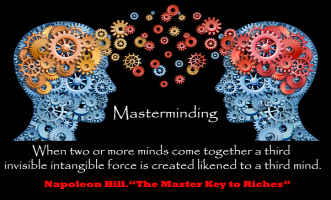
12-simple-tricks-to-success-part-4
Trick number four:
“Build your networks wisely.”
. . . Find mentors, Coaches and Key Advisers.
The people we associate with, personally and professionally, become part of our network and affect our success rate. Each of us has a unique set of friends, associates and colleagues.
Our networks can help us advance or hold us back. When our networks expand, our careers build. When our networks stagnate, our careers stagnate. Networking has the potential to greatly determine how much opportunity we encounter.
Building our networks involves meeting as many people as we can. This was easier in sales careers than others in the past, and as a result, the sales profession created more millionaires than other professions. It’s different now.
Social media and the internet has changed the world and expanded opportunity. Regardless of our career choice, we have many opportunities for creating and expanding our networks and our careers.
Aside from going the extra mile at work (which helps influence networks positively), we can go the extra mile in building networks — work and personal. Facebook, Twitter, Instagram, Pintrest, Youtube, LinkedIn and other social media sites can generate many new contacts. Signing up to blogs, email lists and listening to podcasts can help us too.
Don’t forget the personal face-to-face networking options though. They are very important. We can become involved in school functions with our children, corporate sports teams, community associations, chambers of commerce, or adult education courses. There are many options, personal and online, but remember — it’s up to each individual to follow through on them. You are the only person who can build your network.
Although each person’s network is unique, everyone’s network would benefit from the addition of a few key advisers. First and foremost are good mentors — people we can trust and talk too openly and who have expertise in an area of life we are working in or have a passion for. Mentors can save us much time in the world of trial and error.
Being part of mastermind groups is also key to positive networking and success. “When two or more people come together in common focus, a third invisible intangible force is created likened to A THIRD MIND.” …Napoleon Hill. Get the third mind working for you. Everyone is part of different mastermind groups. Masterminding is an expansion of the peer mentoring concept and can take different forms.
When a mentor and mentee come together to help the mentee, a mastermind group is formed. When two or more mentees work together to bounce ideas between them, with a focus on improvement for each other, they are masterminding. Work teams are mastermind groups: A sales team is a mastermind group focused on increasing sales. An accounting team is a mastermind group focused on tracking funds. Often, work mastermind teams could benefit with more focus on goals and communication structure. Hiring a coach to facilitate might help your work mastermind teams be more effective.
Even families are a type of mastermind group. They typically focus on maintenance and expansion of love.
Get the third minds working for you! Make sure members in your mastermind groups are on the same page — that they are clear on goals and progress for the group, and the goals for individuals in the group. Set a schedule for meetings and keep to it. Even if one member can’t make it to a meeting, do the meeting with who can.
It’s a good idea to acquire two additional network components. When I was starting my cellular phone business, a mentor told me to make sure I had good advisers for legal and accounting processes. Especially when we are self-employed, but even if we are not, having a good lawyer and accountant keep us safe and informed on legal and tax matters.
If we are determined to proceed on the path to success, we will without doubt need accounting and legal advice at some point—whether we’re buying a house, doing our taxes, or closing a deal on a corporate merger. As our wealth builds, good accountants and lawyers become more important.
I think it’s important to have a couple communications mentors. Communicating is something most people could become better at. I’ve found, when I survey employees for companies, it’s the most identified issue for improvement in businesses.
When we are faced with crucial conversations and difficult circumstance, how we communicate is very important. I will often make a phone call to a communications expert before I tackle a tough situation or conversation with others. I encourage those I coach to do the same.
Another key adviser might be a good psychologist. There are many obstacles on the path to success — career setbacks, emotional struggles, and self-doubt to name a few. A psychologist can help us deal with complicated emotional processes during difficult periods. Psychologists are expensive, however, so if funds are unavailable, we can seek a life process mentor—a compassionate friend or advisor whom we trust enough to share the intimate details of our life. Typically, this is someone we respect and admire, and he or she will have experienced the same situation or issue we are experiencing in our life.
Be careful with life process mentors and psychologists. We don’t want one that will enable us, and allow us to stay stuck in our past emotional traps and dysfunction, justifying our inability to move forward. We want to acknowledge our dysfunction and get tools to move through it, over it, under it, or around it when it triggers. Progress is what matters if we want to grow into all that we can be.
For successful people, the process of building networks continually shifts. People in our network can play different roles at different times. When I was deciding to move my cellular phone business to a larger store, I hired one of my mentors as a consultant/coach to help me complete a business plan and hire sales people. He coached me on what to say to the bank in order to get financing and on how to interview prospective personnel. In essence, he coached me on making decisions, like he always had as a mentor. During this period, the relationship was similar but intensified because I was paying him for a specific purpose. Mentoring is free, coaching is done for a fee. Later the relationship shifted to one of peer mentoring.
For successful people the process of building networks seldom stops. They understand that the more people they know, the more advice they will receive, the more sales they will make and the more fun they will have. If they can think of one or two people they’d like to adopt as mentors or peer mentors, they adopt them. We can do the same.
We do not have to accept everything our mentors, accountant, lawyer or psychologist says as the absolute truth, but we can listen and decide what is best for our situation. The more opinions we collect from people we trust, the more options we become aware of, and the easier it becomes to make decisions. We can save ourselves a great deal of time and hardship by listening to capable people whom we trust to have our best interest in mind.
Go out and build your network. Shift it where it needs to be shifted. Be open. Be confident and grow.
Have a great day.
Thanks for reading.







 Daily Inspirational Email Sign Up
Daily Inspirational Email Sign Up